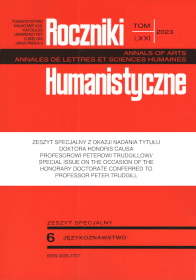On Understandings of Politeness in Greek, Again!
On Understandings of Politeness in Greek, Again!
Author(s): Maria SifianouSubject(s): Language and Literature Studies, Applied Linguistics, Sociolinguistics
Published by: Towarzystwo Naukowe KUL & Katolicki Uniwersytet Lubelski Jana Pawła II
Keywords: im/politeness; non-academic conceptualisations; respect; helpfulness; kindness; sincerity; non-verbal communication
Summary/Abstract: Recent discursive approaches to im/politeness have emphasised the significance of exploring non-academic understandings of im/politeness. Pursuing this line of research, the data for this paper come from a questionnaire distributed to 100 undergraduate female university students. The informants were asked to provide some attributes of a polite person and offer examples of a person or behaviour that impressed them as being polite. The aim was to elicit the respondents’ perceptions of what constitutes politeness. The results show that the prevalent attributes of a polite person for these informants are helpfulness and unconditional respect, along with kindness. These constitute a web of closely related concepts based on goodness and genuine concern for the other, with respectfulness and kindness probably motivating helpfulness. This finding suggests that non-academic understandings of politeness are broader and not confined to language use, which has been the locus of most im/politeness research.
Journal: Roczniki Humanistyczne
- Issue Year: 71/2023
- Issue No: 6S
- Page Range: 251-271
- Page Count: 21
- Language: English

